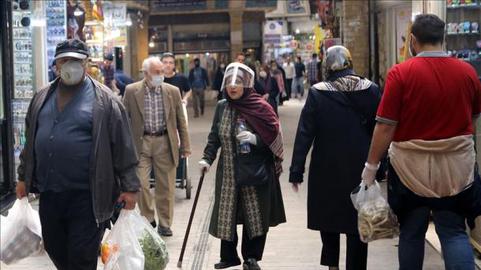While Iran’s health ministry continues to manipulate the number of coronavirus infections and fatalities and downplay the scope of the pandemic, on July 6, the CEO of Tehran’s Behesht Zahra Cemetery expressed alarm at the number of deaths in the Iranian capital, which he said had reached an unprecedented level in the past 75 days. He warned that the situation had to be controlled, or else Tehran would once again be in a critical situation.
Outside the capital, the situation also continued to be critical, but Iran’s officials refuse to fully acknowledge the extent of the problem, whether in Tehran's provincial surroundings or in the provinces of Fars, Isfahan, Mazandaran, Zanjan, Khuzestan, Alborz, Lorestan and Hormozgan. A medical university official in Hormozgan province has said that the government’s insistence on businesses reopening has led to a much worse second spike there.
According to the guidelines set by the health ministry, the decision about whether a Covid-19 patient undergoes treatment should be determined by the results of a lung CT scan. However, the ministry continues to manipulate the data by separating figures for patients who have tested positive for coronavirus and those who are hospitalized because they suffer from “acute pulmonary syndrome.”
Occasionally, the contradictory statements made by health officials undermine the overall effort to manipulate data. For instance, on July 6, Ali Ahmad Aghapour, president of Urmia University of Medical Sciences, reported the purchase of two CT scan machines for the cities of Urmia and Miandoab. According to him, the purchase was made to better diagnose coronavirus patients in these two “red” cities. This will undoubtedly make the government habit of arbitrarily differentiating between pulmonary problems and COVID-19 more complicated.
Despite warnings from provincial officials and health specialists in several hospitals, the health ministry’s public relations office continued to be positive. “By wearing masks, washing hands and observing social distancing rules we have a 95 percent chance of preventing coronavirus infection,” ministry public relations official Kianoush Jahanpour said, adding that the country could fend off the virus in between 14 and 28 days. Although Jahanpour was officially replaced by Sima Sadat Lari as the spokesperson for the ministry on June 9, he is still managing aspects of public relations for the ministry.
If the man who runs one of the capital’s major cemeteries is worried, why do the leaders of the country seem unperturbed and, even worse, attempt to mislead people by giving them false information?
The Health Ministry’s Official Figures
Entering into her second month as the health ministry spokeswoman, Dr. Sima Sadat Lari said the 10 provinces of Khuzestan, Hormozgan, Bushehr, East Azerbaijan, Kurdistan, West Azerbaijan, Kermanshah, Hormozgan, Razavi Khorasan and Ilam remained in a “red” state of alert and the six provinces of Golestan, Alborz, Kerman, Yazd, Hamedan and Sistan and Baluchistan were also on alert, albeit in a less critical state. She said that, as of July 6, 1,820,000 coronavirus tests had been conducted in Iran, a country with a population over 82 million.
According to Dr. Sadat Lari, 2,613 new coronavirus cases had been identified in the 24 hours covering July 5 and July 6, and out of those people, 1,468 had been hospitalized. The new cases bring the official total of coronavirus infections in Iran to 243,051 and with the death of 160 Covid-19 patients in the last 24 hours, the official death toll stood at 11,731 since the start of the epidemic. The official figures seriously downplay the real extent of the damage done by the pandemic.
IranWire receives the daily figures for the fatalities in Tehran through its own exclusive sources, and based on death certificates issued for the bodies handed over for burial to Behesht Zahra Cemetery. According to these figures, between February 20 and July 6, a total of 6,170 Covid-19 patients have died in Tehran.
According to the same figures, on Monday, July 6 alone, the bodies of 71 victims of coronavirus in Tehran were brought to Behesht Zahra Cemetery.
Shortages, Worries Over Schools, A Final Embrace of Masks
Despite hospitals making regular complaints about shortages of equipment, and in particular, oxygen concentrators, officials from the Ministry of Industry, Mine and Trade insisted they were planning to export ventilators and oxygen concentrators to other countries.
Rashid Heydari Moghadam, president of the University of Medical Sciences of Hamedan, said an oxygen concentrator can serve the needs of 40 patients, so if intensive care unit (ICU) patients exceed this number, providing them with oxygen could become a problem, noting that in late June and early July Hamedan province had difficulty getting the oxygen concentrators it needed. Heydari Moghadam said the number of patients with acute pulmonary syndrome in Hamedan had grown three-fold and if it reached four-fold, the health system would not be able to cope due to the shortage of oxygen concentrators.
Keyvan Gardan, director general of the Ministry of Industry’s Electricity, Electronics and Home Appliances, said that the production of facemasks had increased at least 3,000 times since February 20 and that as of July 6, there were at least 50 industrial units producing more than six million masks per day.
The National Coronavirus Taskforce’s decision to reopen schools on September 5 was made before Iran was hit by a second wave of the coronavirus epidemic, but, according to officials, if this wave intensifies, the date could be changed.
Anxiety over the future of university students continued, with Ebrahim Khodaei, head of the National Testing Organization, urging the nationwide university entry exams to go ahead. If they did not, he warned, it would have a detrimental effect on students hoping to study master’s and doctorate’s degrees. Students who pass the exams will start their courses in late October, he said.
Passengers, taxi drivers and others involved with operating taxi fleets across the country must wear masks as ordered by the National Coronavirus Taskforce, reported Morteza Zameni, president of the Taxi Drivers Union.
Since the outbreak of coronavirus in Kurdistan, 35 people have been arrested and sent to court for crimes against public health. According to Colonel Amir Houshang Heydarian, the deputy commander of Kurdistan police, the arrested individuals were charged with smuggling and hoarding health products, including masks.
Businesses Reopen but Blame is on the People (and Dust Storms)
Although the first wave of the epidemic in the province of Hormozgan, with 520 hospitalized Covid-19 patients, was not exceptionally virulent, the government’s insistence on businesses reopening has caused it to have a far worse second wave. According to Hossein Farshidi, the president of Hormozgan University of Medical Science, the number of cities on “red” alert in the province had risen to 10. He added that wearing masks had become mandatory at the end of June across the province, and this has become especially important in the port city of Bandar Abbas, where storekeepers, taxi drivers, and office employees were all observing the practice, as were people in public spaces.
The province of Khuzestan has been a “red” or danger zone for the last 50 days, and more than 50 percent of the province’s population live in “red” and “orange” alert areas. Health officials, however, have invested time in blaming people for the continuing crisis rather than taking effective steps to stop it.
If they were not blaming the people, they turned attention to factors outside the government’s control. For instance, Mohammad Alavi, head of Khuzestan Health Center, said the main reason for the continuing spread of coronavirus was the dust storms that for years have been pounding Khuzestan, causing the rate of asthma in the province to double. He also blamed blood pressure, obesity and a sedentary lifestyle as other reasons for the continuing spread of coronavirus in the province.
According to Alireza Armani Kian, vice president of Zanjan University of Medical Sciences, in the coming weeks the number of ICU beds in hospitals linked to the university will reach 150. Each bed costs more than 1.4 billion tomans, or US$70,000, he said.
The number of coronavirus cases and patients who need to be hospitalized in ICU is increasing in the province of Sistan and Baluchistan, according to Mohammad Hashemi Shahri, president of Zahedan University of Medical Sciences. He warned that the crisis was so bad that in a number of hospitals the wards for coronavirus patients were at full capacity and in other hospitals, more than 95 percent of beds for these patients were occupied.
By July 6, beds in the infectious diseases ward at Sajjadyeh Hospital in the city of Torbat-e Jam in the southeast of Razavi Khorasan province were full. The city is in a critical condition, reported Mohammad Reza Afkar, president of Torbat-e Jam University of Medical Sciences.
Coronavirus infections are on the rise in Ardebil, reported Masoud Emami Yeganeh, the city’s governor, and warned that indoor wedding or mourning ceremonies must be avoided and urged people to take health guidelines seriously.
Museums in East Azerbaijan and libraries in Tehran were closed as some lockdowns returned to areas where coronavirus was once again surging.
This is part of IranWire's coronavirus chronology. Read the full chronology
visit the accountability section
In this section of Iran Wire, you can contact the officials and launch your campaign for various problems



























comments